Democrats have grown increasingly disenchanted with marriage while Republicans, who support the institution, generally oppose public policies designed to help struggling families, according to the ninth annual American Family Survey.
“Support for marriage as a path to stable, committed relationships is declining among those on the left,” said the authors of the report released Dec. 5 by the Wheatley Institute and Deseret News. “With a few exceptions, the right generally does not see a strong need to provide public support to families confronting economic trouble and vulnerability.”
Researchers also discovered political ideology is coloring how marriage and family are perceived in the U.S. “The way Americans perceive challenges facing the family as an institution has less to do with the actual challenges families face and more to do with differences in partisan worldviews.”

Jason Carroll
Overall, Jason Carroll, associate director of the Wheatley Institute, said it’s good to see in the data that the general public supports the family and discerns the challenges families face.
“Still, it is disappointing to see that family as a concept is increasingly used by political parties for their own ends,” he said. “This is unfortunate. The institution of family is a vital component of American life. We need a true coalition for families to put aside their prejudices and come together for the greater good.”
Researchers conducted interviews with a representative sample of more than 3,000 American adults in August on a range of issues affecting families, including mental health, the economy, social media, education and reproductive rights.
“There is still much to learn, but one of the conclusions we have already drawn is that the institution of the family — the most basic unit of society where children are socialized and people receive their key physical and emotional support — is increasingly politicized,” the report says.
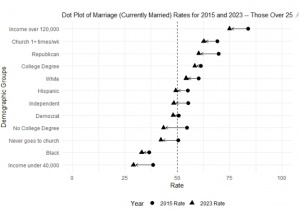
The study found marriage rates have been declining across demographic groups since 2015, but with Republicans and weekly churchgoers remaining ahead of the pack.
The marriage rate for Democrats declined from 51% in 2015 to about 49% in 2023. Among Republicans and Americans who attend church weekly, the rate dropped from the low 70 percent range to around 60% in that same span.
Respondents also were asked about their approval of marriage. Democrats’ view of marriage was negative in 2015 and declined further in 2023, as did the view of Americans who never attend church.
Republicans’ positive assessment of marriage in 2015 trended slightly higher this year, while those who attend church at least weekly saw a significant increase in their already positive view of marriage. Those who attend church weekly are by far outliers in their sunny view of marriage.
“One could take these graphs and argue that the Republicans simply are the pro-marriage party, and in some ways that is true. But it is also true that Republicans are the most hesitant to support marriage and families with government spending,” the report explains.
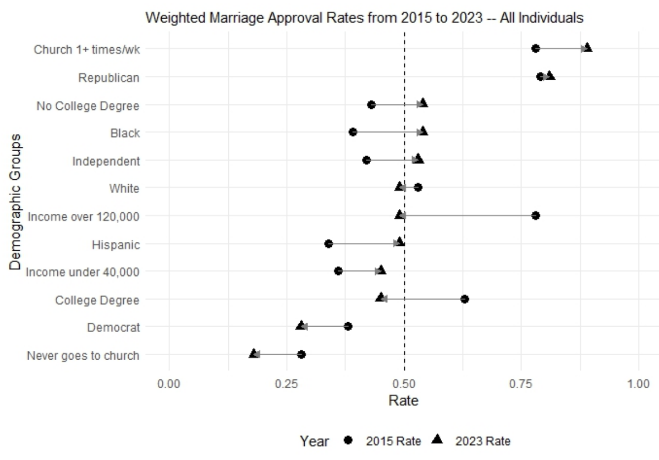
But statistics gathered last year tell a different story. The study reported 50% of Democrats have supported child tax credit payments to continue for families, while only 16% of Republicans did so. When asked if Congress should approve legislation providing additional support for families, 55% of Democrats said yes and 19% of Republicans said no.
“Republicans favor families as an institution, but they are currently unwilling to commit public resources to the families that see themselves as struggling. Note that this opposition comes even as families report struggles and problems,” the report explains.
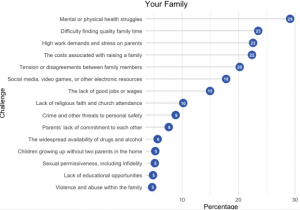 Respondents identified numerous challenges facing their own families, chief among them physical and mental health struggles, at 29%. Difficulties finding quality time and high work demands and stress on parents (both 23%), the costs of raising families (22%) and tensions or disputes among family members (20%) rounded out the top five.
Respondents identified numerous challenges facing their own families, chief among them physical and mental health struggles, at 29%. Difficulties finding quality time and high work demands and stress on parents (both 23%), the costs of raising families (22%) and tensions or disputes among family members (20%) rounded out the top five.
Video games, social media and electronic devices also were a major concern for 18% of respondents, compared to poor jobs and wages at 15% and lack of faith and church attendance, at 10%. Drug and alcohol abuse, single-parent homes, sexual promiscuity and violence and abuse rounded out the list.
“Perhaps most strikingly, we find remarkable agreement across the political parties about these concerns,” the report says. “Democrats were more likely than Republicans to choose mental or physical health struggles (32% vs. 23%) and tension or disagreement between family members (24% vs. 15%).”
But conservatives placed a higher value on religion in the survey: “Conversely, Republicans were more likely than Democrats to identify a lack of religious faith or church attendance and crime and other threats to personal safety (15 % vs. 5% in both cases) as important.”
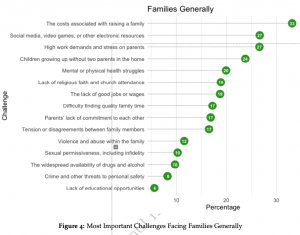 Leading concerns changed when respondents were asked to consider family as a general category. From that perspective, the top five concerns were the costs of raising families (33%), social media and high demands on parents (both 27%), children growing up without two parents (24%) and mental and physical health struggles (20%).
Leading concerns changed when respondents were asked to consider family as a general category. From that perspective, the top five concerns were the costs of raising families (33%), social media and high demands on parents (both 27%), children growing up without two parents (24%) and mental and physical health struggles (20%).
The survey found more partisan consensus when respondents considered their own families versus the family as an institution.
“In other words, there is far more agreement than disagreement across party, religion and income in respondents’ assessments of their own familial challenges. When asked to reflect on the experience of their own family life, Republicans and Democrats mostly identify similar problems and difficulties. But when they consider the state of the American family more broadly, this consensus evaporates. Partisans focus on different sets of challenges and concerns, and the divide between the parties tends to be substantially larger.”
Mental health was a major concern for 40% of Americans who said they believe the emotional struggles of teens, including suicide, is the biggest problem facing young people. “Women (46%) expressed greater concern than men (34%) about teen mental health.”
The study found more than half favored expanding mental health services for families and children and “46% of respondents reported that they have faced financial constraints or an inability to find a medical care provider they can trust.”
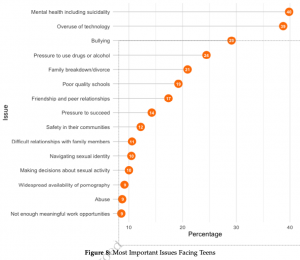 The survey’s examination of parenting and social media found 24% of parents “rarely or never” worry about the social media content their children consume. But 68% said they follow their children on social media and 47% said they check their children’s social media account at least weekly.
The survey’s examination of parenting and social media found 24% of parents “rarely or never” worry about the social media content their children consume. But 68% said they follow their children on social media and 47% said they check their children’s social media account at least weekly.
“However, seven out of 10 parents report they want the government to do something about social media usage among children, yet only 38% report they would favor suing social media companies.”
Economic issues also were a concern for most Americans, the survey said, with 41% citing the costs of raising families a major problem, while 31% identified high stress and work demands on parents as significant impediments for their families.
“While no partisan differences were detected in concerns about high work demands and stress on parents when answering for ‘your family,’ when asked about ‘families generally,’ Democrats expressed substantially more worry about the issue than Republicans, resulting in a 4.1 percentage difference,” the summary explains.
When asked about education, 70% of respondents said schools should devote more time to teaching life skills to their children, and Democrats and Republicans both expressed worry about biased school curriculum.
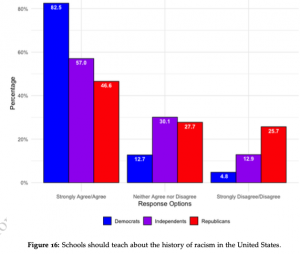 “More than six in 10 Republicans and Democrats expressed concern about biased teaching about racism and the nation’s history of race relations, but when asked whether schools should teach about the history of racism in the United States, more than eight in 10 Democrats said yes, compared to less than half of Republicans,” the report notes.
“More than six in 10 Republicans and Democrats expressed concern about biased teaching about racism and the nation’s history of race relations, but when asked whether schools should teach about the history of racism in the United States, more than eight in 10 Democrats said yes, compared to less than half of Republicans,” the report notes.
The study also uncovered concerns on teaching about gender and sexuality. “About two-thirds of respondents said they were ‘somewhat’ or ‘very’ worried about how LGBTQ content might be taught in their local schools,” with Republicans more concerned than Democrats by a 24-percentage point difference.
A majority of respondents (68%) said the first or second trimester should be the limit for legal abortion, the study found. “Many people do want to see prosecutions for abortions obtained in states where abortion is restricted — 39% would prosecute a doctor for an abortion; 30% would prosecute the woman receiving the abortion; and 22% would prosecute those paying for the procedure.”


